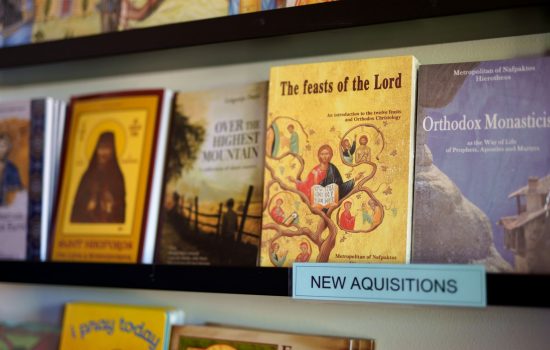We often hear about people having different interests. Sometimes different interests work well between people to complement each other’s weaknesses and other times causing major problems by allowing people to grow apart. When we think of differing interests we often think of different people to whom contrasting views, beliefs or values belong. Nowhere is this perhaps more obviously personified than in politics.
But it is not just between people that the different interests are evident. We often fail to acknowledge and respond to the contrasting and differing interests that exist within us. These differing interests originate from different sources within our inner person, namely the intellect and the heart. Whilst the intellect is the rational, logical and reasoning centre of our person, the heart is the compassionate, loving and spiritual centre of our being. Can these two work well together?
In a wonderful book on the life of Elder Porphyrios (1906-1991), Testimonies and experiences by Klitos lannidis, Athens 1977, an Archimandrite who was studying theology one day asked Fr Porphyrios whether the intellect has the lead over the heart or the heart over the intellect in our daily lives.
Fr. Porphyrios enlightened with great spiritual wisdom answered accordingly: “The intellect” he said, “wakes up and thinks about what lie it will say to dupe the customer; if he’s a businessman, how he should act there, what he should say to this person, what he should say to that person, how he’ll get hold of more money. The heart on the other hand, sees a small child and pampers it… He puts his hand in his pocket and gives some money to a disabled person. He runs to the hospital and visits someone who is sick… He willingly offers his services or he gives money. When the heart speaks the hand goes into the pocket. When the intellect speaks, the hand stays out of the pocket. Therefore, for me the heart comes first.” (pp. 161)
Fr Porphyrios goes on to say that “the intellect is not interested in prayer, in what the heart pursues. They have different interests.”
Which Rules?
The Intellect or the Heart?
If the intellect is allowed to rule our life and to take the lead, it is impossible to hear God’s Word as it is impossible to pray. “I thank you, Father, Lord of Heaven and earth” said Jesus, “that You have hidden these things from the wise and prudent and have revealed them to babes.”
(Matt. 11:25, also Luke 10:21)
God opens the hearts of those who are responsive to Him enlightening them to receive His knowledge.
“Assuredly, I say to you” said Jesus, “unless you are converted and become as little children, you will by no means enter the kingdom of heaven.” (Matt. 18:3)
The worldly wise, the scholarly learn to rely on their intellect which can become so strong that it blocks out the interest of the heart. “By speaking of the heart” said Father Porphyrios “we don’t mean the flesh of the heart. The heart is further in, more internal.” When “the intellect is restrained” on the other hand, “we have a self-denying comedown.”
The intellect seeks to uplift us to raise us up, to exalt us to make us feel important, to suggest that we are someone of importance, someone that should be recognised. These things are not what please God. “Blessed are the poor in spirit” said Our Lord, “For theirs is the kingdom of heaven” (Matt. 5:3); “Blessed are the meek, For they shall inherit the earth.” (Matt. 5:5) “Blessed are the pure in heart, For they shall see God.” (Matt. 5:8)
We should nevertheless be careful not to malign the intellect, for it is not the intellect itself that does us such disservice, but rather our pride so that we learn to misuse the gift of the intellect; and because it serves our self interest so well, we allow it to take the lead and rule our lives. Father Porphyrios points out that our task is to keep the intellect under strict control so that it does not learn to serve our own self-interest and pride, but to serve God.
“You should always direct your intellect towards God, whether asleep or awake, eating or talking, engaged in your handiwork or in any other activity” said St Symeon the New Theologian (916-987: AD Philok. Vol. 4 pp. 56) “Thus” refers St. Symeon, “you will fulfil the saying of the prophet, ‘I have set the Lord always before me’” (Ps. 16:8)
When our intellect surrenders itself to the heart and the heart’s allegiance is with Christ our different interests are over-taken. This was the experience of those who were gathered at Pentecost and the early Church. Is this spirit evident in today’s Church? Those who were gathered at Pentecost were of “one accord.” (Acts 1:14) “Now the multitude of those who believed were of one heart and one soul; neither did anyone say that any of the things he possessed was his own, but they had all things in common.” (Acts 4:32)
Our Chance to Communicate with God
Their coming together at Pentecost prepared them for communal prayer. Father Porphyrios tells us that it is easy to speak of the intellect surrendering to the heart but putting it into practice is another matter altogether which is critical in realising prayer. “The intellect rests in cunningness” says Father Porphyrios, “whereas the heart tries to communicate with the divine. What therefore must happen?” he says. “Do you know that there are chances to communicate with God? When? In extreme spiritual or bodily pain the intellect surrenders, restrained by the desire of the heart.” (pp. 161)
Any kind of prayer requires great effort. “Only when a person suffers bodily and spiritually, only then can he open the door to Christ” says Father Porphyrios.
Contemporary non-Orthodox views about being Christian would experience great difficulty accommodating this notion that the door to Christ can only be opened through bodily and spiritual suffering. It seems that the modern world cannot perceive the true value of pain and suffering. Indeed any thought of pain and suffering is regarded as unnecessary, undesirable and unbearable. Compassion these days is not based on heartfelt sorrow, forgiveness and love but putting us out of our misery no matter what, so that we lose our opportunity to come closer to God who suffered greatly for us.
Fr Emmanuel Stamatiou


















